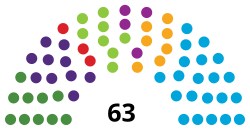Alþingi
|
Icelandic Parliament Alþingi Íslendinga |
|
|---|---|
 |
|
| Type | |
| Type | |
| Leadership | |
|
Unnur Brá Konráðsdóttir
Since 24 January 2017 |
|
| Structure | |
| Seats | 63 |
 |
|
|
Political groups
|
Governing coalition (32)
Opposition parties (31)
|
| Elections | |
| Party-list proportional representation | |
|
Last election
|
29 October 2016 |
|
Next election
|
29 October 2020 |
| Meeting place | |
 |
|
|
Alþingishúsið Austurvöllur 150 Reykjavík Iceland |
|
| Website | |
| www |
|
Governing coalition (32)
Opposition parties (31)
The Alþingi (anglicised as Althingi or Althing) is the national parliament of Iceland. It is the oldest parliament in the world. The Althing was founded in 930 at Þingvellir ("thing fields"), situated approximately 45 kilometres (28 mi) east of what later became the country's capital, Reykjavík. Even after Iceland's union with Norway in 1262, the Althing still held its sessions at Þingvellir until 1800, when it was discontinued for 45 years. It was restored in 1844 and moved to Reykjavík, where it has resided ever since. The present parliament building, the Alþingishús, was built in 1881, of hewn Icelandic stone.
The unicameral parliament has 63 members, and is elected every four years based on Party-list proportional representation.
The constitution of Iceland provides for six electoral constituencies with the possibility of an increase to seven. The constituency boundaries and the number of seats allocated to each constituency is fixed by legislation. No constituency can be represented with less than six seats. Furthermore, each party with more than 5% of the national vote is allocated seats based on its proportion of the national vote in order that the number of members in parliament for each political party should be more or less proportional to its overall electoral support. If the amount of voters represented by each member of Alþingi in one constituency is less than half of another, the Icelandic National Electoral Commission is tasked with altering the allocation of seats to reduce that difference.
...
Wikipedia
